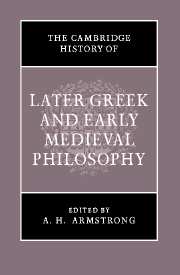Book contents
- Frontmatter
- Chapter 1 Introductory
- Part 1 GREEK PHILOSOPHY FROM PLATO TO PLOTINUS
- Part II PHILO AND THE BEGINNINGS OF CHRISTIAN THOUGHT
- Part III PLOTINUS
- Part IV THE LATER NEOPLATONISTS
- Part V MARIUS VICTORINUS AND AUGUSTINE
- Chapter 20 Marius Victorinus
- Chapter 21 Augustine. Biographical introduction: Christianity and philosophy
- Chapter 22 Augustine. Man: body and soul
- Chapter 23 Augustine. Reason and illumination
- Chapter 24 Augustine. Sense and imagination
- Chapter 25 Augustine. Human action: will and virtue
- Chapter 26 Augustine. God and nature
- Chapter 27 Augustine. Man in history and society
- Part VI THE GREEK CHRISTIAN PLATONIST TRADITION FROM THE CAPPADOCIANS TO MAXIMUS AND ERIUGENA
- Part VII WESTERN CHRISTIAN THOUGHT FROM BOETHIUS TO ANSELM
- Part VIII EARLY ISLAMIC PHILOSOPHY
- Select Bibliography
- Additional Notes and Bibliography
- Index of ancient and medieval works referred to in the text
- General Index
- Index of Greek terms
- References
Chapter 27 - Augustine. Man in history and society
from Part V - MARIUS VICTORINUS AND AUGUSTINE
Published online by Cambridge University Press: 28 March 2008
- Frontmatter
- Chapter 1 Introductory
- Part 1 GREEK PHILOSOPHY FROM PLATO TO PLOTINUS
- Part II PHILO AND THE BEGINNINGS OF CHRISTIAN THOUGHT
- Part III PLOTINUS
- Part IV THE LATER NEOPLATONISTS
- Part V MARIUS VICTORINUS AND AUGUSTINE
- Chapter 20 Marius Victorinus
- Chapter 21 Augustine. Biographical introduction: Christianity and philosophy
- Chapter 22 Augustine. Man: body and soul
- Chapter 23 Augustine. Reason and illumination
- Chapter 24 Augustine. Sense and imagination
- Chapter 25 Augustine. Human action: will and virtue
- Chapter 26 Augustine. God and nature
- Chapter 27 Augustine. Man in history and society
- Part VI THE GREEK CHRISTIAN PLATONIST TRADITION FROM THE CAPPADOCIANS TO MAXIMUS AND ERIUGENA
- Part VII WESTERN CHRISTIAN THOUGHT FROM BOETHIUS TO ANSELM
- Part VIII EARLY ISLAMIC PHILOSOPHY
- Select Bibliography
- Additional Notes and Bibliography
- Index of ancient and medieval works referred to in the text
- General Index
- Index of Greek terms
- References
Summary
We must begin an account of Augustine's views on human history with a distinction between ‘sacred history’ (Heilsgeschichte) and secular history. He does not often use such phrases, but the distinction is implicit in all his utterances. Sacred history is the history of God's revelatory action among men, contained in the books of the Old and New Testaments. It concerns the redemption of the human race wrought in the work of Jesus Christ, and the preparation for this in the history of the chosen race, Israel. In these actions God has revealed his purpose in history; and the Scriptures are their record, the authoritative and certain source for Christian belief. The Scriptures, however, are not a mere formless historical record; the narrative they contain is shaped by the interpretative action of their authors, and would, indeed, be meaningless without this. Being inspired by the Holy Spirit, the significance with which the authors endow the events recorded is itself of divine origin. The scriptural history is therefore sacred in the double sense of containing a narrative of divine action and of telling the narrative in terms of divine providence, endowing its events with a significance within God's plan. Apart from the sacred history contained in the Scriptures, men have no revelation of God's plan, no indication of the significance of historical events in terms of God's purposes. Christians are in the same position as secular historians, except in regard to scriptural history.
- Type
- Chapter
- Information
- Publisher: Cambridge University PressPrint publication year: 1967

